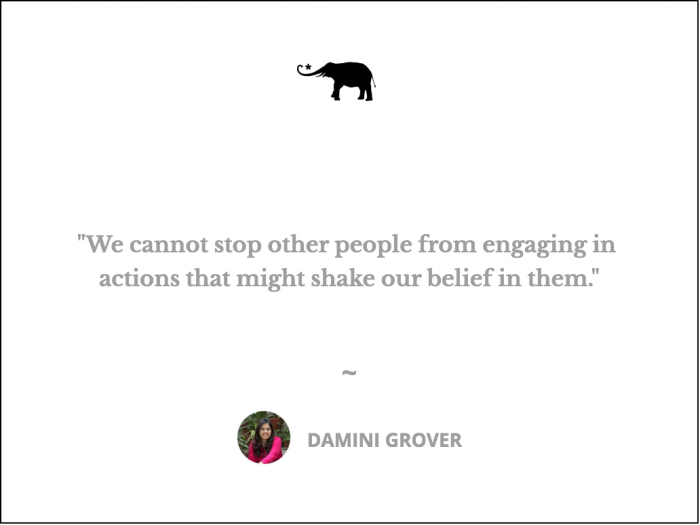I love to start all my articles with a quote.
I love quotes! They also help me to align my ever-so-scattered thoughts and offer varied perspectives on the same thing.
As I began writing this one, I couldn’t find a quote to start the article with. Then I searched for the definition of trust, and what I found amused and enlightened me at the same time.
A simple way of defining trust (a random Google search) is a firm belief in the character, strength, or truth of someone or something in which confidence is placed.
If we look at trust from the point of view of beliefs, then all we are really saying is that “I believe that this person will do something for me or play a certain role in my life or fulfill certain needs like support, understand, be there for me, or treat me with fairness and love.”
When we believe in someone like that, that’s when we are able to engage in a give-and-take in relationships.
So we place a firm belief—a responsibility—on this person, and everything is fine till one day, it isn’t.
The fact of the matter is that it takes two to tango.
Building and creating trust requires two things from us:
1. Our understanding of our own needs and expectations from our relationships and people around us.
2. Our analysis of the person about whom we’re choosing to believe something.
Thus, I have to choose the right person to trust and the other person should be capable to live up to my trust or belief (i.e. it takes certain qualities of the other person involved to be able to gain our trust).
Therefore, trust is a two-way street, and there is a difference between blind trust and mindful trust. Blind trust comes from a state of unawareness, disconnection, and ignorance of our own needs.
Mindful trust comes from a state of connection and attunement with our own self.
Trust is not an infinite resource. It needs constant work just like everything else. Perhaps, trust is the most delicate of all the things that are essential to build and keep a relationship going.
When trust breaks in a relationship, it’s never one person’s fault. We’re all coming from a deeply traumatic space; our mind begins to work in such a way that we lose sight of who we are, of what we want, or perhaps of what we were never given as an opportunity.
Driven by our survival instinct and insecurities, we often lose our analytical power as well. Hence, when the above mentioned prerequisites stand on shaky grounds, there is ample room for trust (which is already misplaced) to simply break into a million hurtful pieces.
We cannot know whom to trust until and unless we know:
>> who we are
>> what we need and desire
>> what we want from our relationships
>> how we want people to show up for us
Otherwise, we leave ourselves at the mercy of whoever is willing to offer us breadcrumbs instead of a whole fulfilling meal.
How can I know if someone is good for me if I don’t know what’s good for me?
And yes, it is true that once trust is broken by someone else, it also breaks our trust in our own selves.
In essence, the issue then is not that we don’t know how to trust people. The issue is that we don’t know how to trust ourselves in order to be able to figure out who deserves our trust and who doesn’t.
Therefore, before looking at others and judging if I can trust them, I need to trust myself with two things:
1. I will choose the people who vibe with me.
2. If they are unable to, I trust myself to do what’s best for me.
We can’t control what others do or how they choose to show up.
However, acting in alignment with our self is up to us so that when they start showing up in a way that is sending ripples in our comfortable world, we can wake up and smell the coffee.
There are some parameters that can help us ascertain if someone is worthy of our trust—of our emotional, physical, intellectual, and psychological investment.
And most importantly, these are the same parameters that apply to us so that we can build trust within ourselves.
There are five questions that we must keep in mind before placing our belief, trust, or faith in someone:
1. Is the person considerate toward my needs, desires, and expectations? Are they able to acknowledge your need for space or to reach out—or engage? Do they respect your boundaries, or are they constantly guilt-tripping you every time you try to create or impose one? Is there a reasonable balance of consideration toward each other within the relationship, or is it always skewed (to the other side)? More importantly, are they even considerate to the people in their inner and outer circle as well? If not, then we must make a mental note immediately.
2. Is the person sincere? Do they really mean what they say? Do their words and actions mirror each other (to a reasonable extent), or are they full of excuses and avoidance? Even if they mess up, can they still show up authentically and be considerate toward the other?
3. Can I rely on this person to be there for me? And not once, but consistently. Do they have the mental, physical, emotional capacity and intent to show up for you when you need them, or are you left on your own devices to figure out what really happened?
4. Can this person take responsibility for their actions? Are they able to accept responsibility and demonstrate accountability for their mistakes, miscommunications, or misunderstandings? Can they own up to their part in the bigger scheme of things, or would they rather deflect, avoid, dismiss, guilt-trip, or blame you or something or someone else?
5. Last but not the least, is this person even competent enough to do what you expect them to do? More often than not, we expect people who are disconnected or avoidant to be present with our emotions. At times, we fail to recognize that maybe the person meets the above mentioned criteria but cannot engage in the desired action for some other reasons. Sometimes, people are not at the same intellectual, physical, and emotional wavelength, and we often realize that way too late.
However, there is one thing that lies underneath and above everything else: are we able to fulfill these criteria for our own selves too?
Can we be considerate, sincere, reliable, responsible for ourselves, and develop the competency of self-awareness, observation, and judgement of what’s in our highest interest or not?
The fact is we cannot stop other people from engaging in actions that might shake our belief in them.
But we can start building ourselves up so that we can begin to filter out individuals worthy of our trust—just enough for us to take a leap of faith. And in case we fall, we know we can always pick ourselves back up and keep going on.
The more we move toward self-awareness and understanding, the more our instincts come into play, and the more we are attuned to our instincts, it’ll take less time for us to judge who resonates at our frequency and who doesn’t.
As this quote by Steve Loy goes, “The path forward starts from the inside; a collection of building blocks that start with understanding your own inner building blocks that then help you connect with others.”
(I did manage to find a quote after all.)
~













Read 70 comments and reply